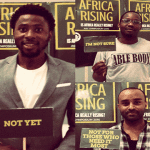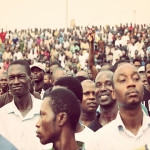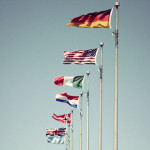Human rights defender seeks shelter at UCG
He stands up against this lack of freedom knowing full well that it is not without the risk of being silenced, threatened and arrested. As a part of the project Shelter City, Abdou has come to Groningen, where the municipality and University College Groningen (UCG) are providing a safe haven for him and a place for him to study and work during his stay in the city.
Shelter City is a nationwide initiative from Justice and Peace Netherlands, a human rights organisation, with the objective of protecting human rights defenders. Groningen and seven other Dutch cities, including The Hague and Amsterdam, provide shelter for human rights defenders from around the world who are being threatened because of the work they do.
When Abdou first heard about Shelter City, he was fascinated by the idea. ‘I felt it was a good way to lower the pressure on me, because in the environment in which I live, you are constantly at risk of being arrested. Usually when this happens, you are detained and not allowed to see your family and lawyers. Sometimes, you are not told why you were arrested and you can be held for many days, weeks or even months.’
A good fit
Abdou has been at UCG since the second week of April, where he has an office and is enrolled in several courses. ‘UCG has welcomed me very well. In my time here, I’ll continue having engagements with the staff, the classes and the discussions with lecturers, but also take part in social activities and give lectures centred around human rights and Africa in general.’
‘The college is not only about doing things right, but also about doing the right thing’UCG chose to get involved in the Shelter City project because the staff thought the initiative was wonderful and fit well with the philosophy of the college. ‘The college is not only about doing things right, but also about doing the right thing. Liberal arts and science is a programme that is also about providing people opportunities to reflect on what is a good life, not only for you, but also for others’, dean Hans van Ees explains.
The University Colleges in Maastricht and Middelburg and the University of Amsterdam are also involved in the project, each sheltering another activist. ‘Part of the programme is to provide possibilities to educate oneself, and I assume that many of these human rights activists have academic degrees’, Van Ees says of the universities’ involvement in Shelter City.
Taking things for granted
First and foremost, UCG hopes to create a good place for ‘their’ human rights defender. Yet Van Ees expects their involvement in the project to also be beneficial to the college itself. ‘We want to address global societal challenges, and human rights is obviously one of them, and geopolitical developments, too. We want to address these issues in an active way that creates awareness among our students and in a way that is effective.’ Van Ees thinks the Shelter City project allows UCG to pursue all these objectives, and the dean hopes to involve the human rights defender in the faculty’s curriculum as much as possible.
Abdou is also eager to participate. He wants to share his story with the staff and students of the university. ‘I think being here is an opportunity to share the story of Africa and my country, to inform people in Groningen of the actual state of affairs inside Africa. As someone who lives in Africa on a daily basis, I think I can share practical experiences which could be beneficial to the people here.’ The human rights defender hopes to give the people in Groningen new perspectives in order to better understand Africa.
When he arrived at UCG, it was immediately clear to him that the difference between his home country and Groningen is huge, especially when it comes to the facilities available and the freedoms people have. He thus wants to spread awareness of the fact that there are parts of the world that do not enjoy things that seem normal to people here in the Netherlands.
‘Making sure fundamental freedoms are protected is an ongoing battle’
‘The message that I hope to get across is that we need international solidarity for the promotion and protection of human rights and human dignity. Making sure fundamental freedoms are protected is an ongoing battle. People in Holland should not take what they have for granted, because it can be taken away. This lesson is embedded in our history and our experiences.’
Understanding differences
Apart from teaching others, Abdou also hopes to learn as much as possible himself from his experience here in Groningen. ‘By observing this community and its daily life, I am learning a lot in terms of how to promote social justice, human rights and sustainable development. Here, there is a lot of respect for human rights and a high level of personal security and personal freedom. In my society, this is not the case. I am trying to understand the factors that are responsible for this difference.’
During his time here, Abdou also wants to get new ideas for how to better do his work. ‘I hope to get more ideas on how to engage with communities and individuals back home, to be able to sensitize them and enlighten them about issues of human rights, about participation in their own affairs and in decision-making processes in order to influence positive change in our society. For people to be able to hold public institutions to account, they need to be empowered with information about their rights. This is important because a lot of the people in my society do not know their rights.’
*Due to potential security risks, a pseudonym was used to refer to the human rights defender. His real name and country of origin are known to the editorial staff.
Photo: Temi Kogbe, Flickr.com






